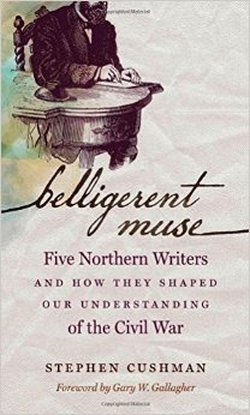
Stephen Cushman
The University of North Carolina Press, 2014, 214 pp. + 14 pp. Introduction, $28.00
ISBN: 978-1-4696-1877-7
Image courtesy of amazon.com
The premise of Belligerent Muse is quite different than anything published in recent years. For the first time, an author has taken a certain few people and analyzed their works in order to understand how we look at the war today. What Stephen Cushman has come up with is interesting in not only an analysis of the war, but of an analysis of the people themselves. The five writers he looks into are Abraham Lincoln, Walt Whitman, William T. Sherman, Ambrose Bierce and Joshua L. Chamberlain. These five essays are pose different questions about the different authors and what we are left with is an excellent work of critical analysis.
Stephen Cushman is the Robert C. Taylor Professor of English at the University of Virginia. His work Belligerent Muse is part of the Civil War America series. This series of works , published by the University of North Carolina Press, publishes historical works that explore all aspects of the war and shed new light on the great conflict. The foreword of this work was written by Gary W. Gallagher.
The essays of the book talk about the many different ways in which these influential authors and officers shaped our understanding of the American Civil War outside of the realm of Lost Cause Historiography since Cushman focuses on Union voices. His analysis of Lincoln is quite interesting in the almost song like style which he wrote his speeches. The two main speeches which he focuses on is the Gettysburg Address and the Second Inaugural and the reasons for which we gravitate toward them. Cushman also talks about the influence which Emerson and his speeches had on Lincoln. The work shines, however, during the essay about Sherman and the way in which he penned his memoirs. This was my favorite chapter in the book and is full with intricate details on the mindset of Sherman. He even shows research into the process of Sherman showing that the officer did not want to print anything that was not true unlike the others who were writing in the Reconstruction period. Throughout the essay on Sherman, there are constant comparisons between Grant and his memoirs. While Grant may have embellished some of the details, Sherman was straightforward and published the truth to the best of his abilities. The essay of Bierce details some of the issues which plagued Civil War fiction since the end of the conflict mainly the description of the dead. Cushman details the inaccuracies in Bierce’s work when dealing with a place such as Chickamauga. The essays close out with the shortest entry into the book on Joshua L. Chamberlain. Chamberlain gained much of his fame recently due to Ron Maxwell’s Gettysburg and Gods and Generals along with the works written by the Shaara family. This essay was the most telling about the officer during the Civil War and the way in which history was written. His analysis of Chamberlain comes off as the “Big Fish” story where the situation became more and more embellished and detailed. The last recounting of the story is left up to the reader and the historian as to the truth of the situation. It can be said that due to Chamberlain’s self-promotion, many historians have questioned the reality of his words over time. This is an angle which Cushman analyzes and concludes in this essay.
This work is interesting in the very scope of what it attempts. For quite some time, there have been historians who have looked into the realm of Lost Cause Historiography but not many have looked into the works of Union soldiers and civilians after the war. What Cushman has delivered here is an analysis on the ways in which the victors wrote the war and even alludes to the people outside his main five subjects. It is quite amazing that five different ways of writing were shown here and these five different ways have even stood tall today in the study of the war. The mindset of “primary sources must be trusted” is a good one to have, but most of them should be taken with a grain of salt as you will see within the essays written here by Cushman. I highly recommend this book to the Civil War student and scholar who wishes to know more about the reality of the sources we trust and I praise Cushman for the scholarship which he has brought to this study.
 RSS Feed
RSS Feed
